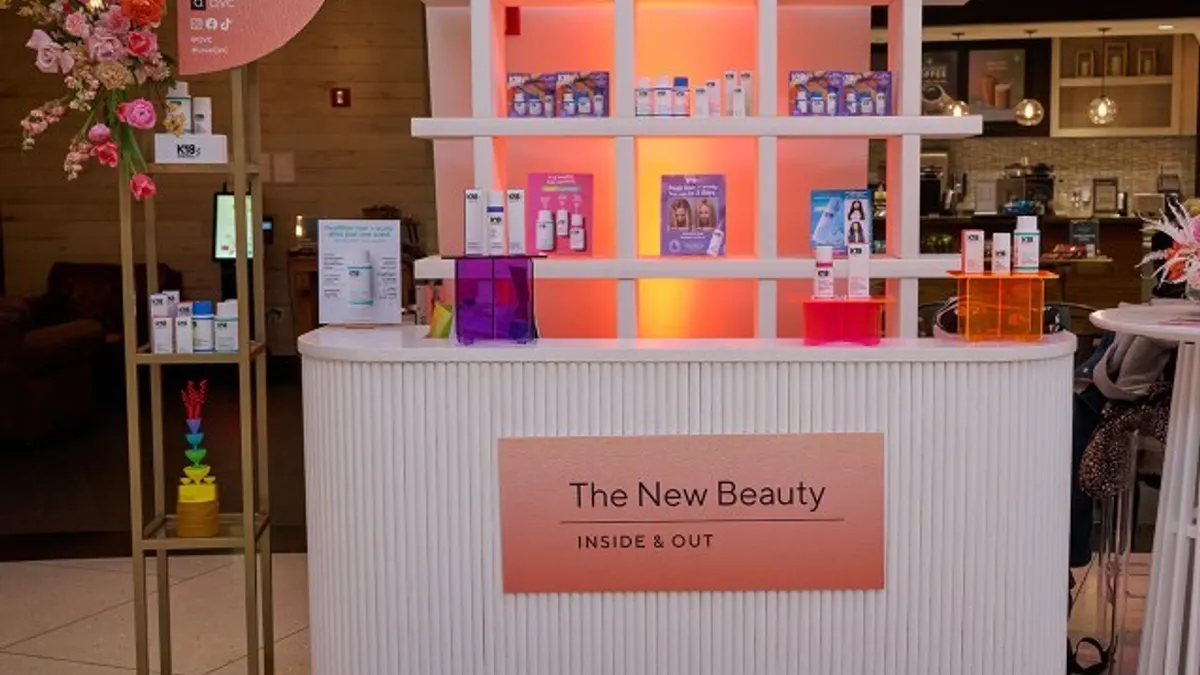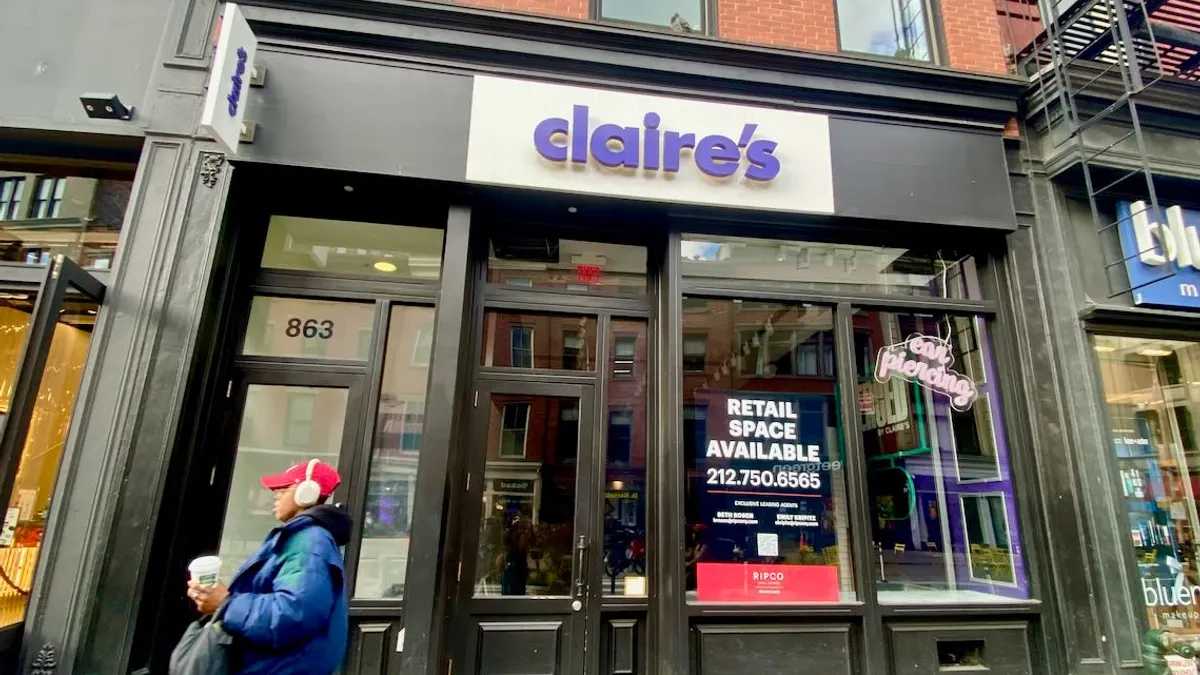For many, the month of June signifies the official start to wedding season. But beyond the save-the-dates and invitations lies the daunting task of navigating the crowded registry space.
From cash funds to charitable donations, registries have evolved far beyond couples venturing into a department store with a scan gun in hand, aimlessly adding items to their stockpile of desired gifts. Dish towels? Scan. Pots and pans? Scan. Ironing board? Scan.
In 1924, Marshall Fields created the gift registry, but it wasn't until the '50s that the experience really took off. These registries typically included the couple's basic necessities for moving into their first house — linens, a toaster, silverware.
But even before this traditional registry experience caught on, young women would prepare for married life by collecting these necessary items in vessels dubbed "hope chests." These chests would help a new bride make a home, and also served as a transitional symbol, from daughter to wife.
"Basically young couples were moving from their parents house to their own house," Stephanie Coontz, director of research at the Council on Contemporary Families, told Retail Dive in an interview.
In 2019, however, consumer behavior is shifting in a way that's making traditional registries less desirable among couples, allowing alternatives to take share in the market.
Why now?
While the traditional department stores that may have come to mind years ago for registries have done little to revamp the experience, the same may not ring true for all retailers.
Companies like Target, The Container Store, Wayfair and Best Buy have since added group gifting options, which allow several guests to contribute together for a single present. A little over a year ago, Target and Honeyfund formed a partnership, which allows couples using Target's registry to add things like travel, cruises and wine tastings through Honeyfund. And online wedding registry Zola teamed up with Crate and Barrel in 2018 to offer customers the ability to register for Crate and Barrel items using their Zola accounts.
Amazon has also made some strides in the space. In addition to offering group gifting options, the retailer also provides guests alternative financing options for gifts, as well as a "Package X-Ray" service, which allows recipients to use the Amazon app to scan the barcode on the giftbox to unveil what's inside even before opening it — a feature that could prove especially useful to couples that know some guests may stray from their registry of selected items.
Even David's Bridal, which filed for bankruptcy in November and reduced its total debt by $450 million, is trying to revamp its registry experience. The retailer announced Monday that its Blueprint registry platform, acquired in August, will now include a website building feature, which will allow couples to "receive RSVP and gift purchase updates straight to their inboxes in real-time," according to a statement from Senior Vice President Nevin Shetty.
But as players like Honeyfund, The Knot's Newlywed Fund and Zola — which all offer the option to form cash registries — gain more attention, more couples are opting for nontraditional things in lieu of gifts.
So why is the shift in consumer behavior occurring now? Social media plays a part.
"It's like a wanderlust," Sara Margulis, the founder of Honeyfund, said in an interview. "You have this platform to show off your adventures. Especially millennial couples who really have been online and on their smartphones for most of their lives. ... They're all about experiences over things."
Millennials are also spending more on their honeymoons, according to Zola's Brand Director Jennifer Spector, and are looking for that "once in a lifetime opportunity," whereas previous generations may have opted for a smaller trip.
But beyond registering for elaborate experiences, cash funds in general are gaining more traction. According to The Knot's 2019 Wedding Registry study, aside from honeymoon-related expenses, the most popular cash funds registered on its website included dining and food experiences, funds for a down payment on a home, physical and mental wellness, and continued learning and recreational classes. Morgan Ward, assistant professor of marketing at Emory University's Goizueta Business School, even noted that she's seen couples register to have their credit cards paid off.
It's important to remember that many of the couples getting married now graduated from school at the height of the recession and, as a result, likely still have the burden of student debt looming over them. This could drive them to want to register for things like getting their student loans paid off, asking for monetary help in financing the wedding or for funds to put a down payment on a house rather than the material goods retailers can provide.
More couples live together before marriage
The average age someone ties the knot is also rising. In 2018, the average age of a man getting married was 30, while a woman was 28, according to the United States Census Bureau. Comparatively, in 1950, the average age of a man getting married was 23, and 20 for a woman.
But along with delaying marriage, it's also becoming more popular to live with a partner out of wedlock. "It's so rare when I hear someone get married and never lived with the other person," Ward told Retail Dive in an interview. "That's becoming much less the norm, at least in urban areas."
Pew research found that in 2016, the number of adults in cohabiting relationships reached about 18 million, a 29% increase from 2007 when 14 million adults were cohabiting. Additionally, adults between the ages of 25 and 34 are most likely to live together before marriage (14%), while adults between the ages of 18 to 24 (9%), and 35 to 49 (8%) are less likely to live together before marriage.
"The stuff is just not sexy. Travel is sexy."

Sara Margulis
CEO and Co-Founder, Honeyfund
Because couples are living together and accumulating things in their homes even before they decide to get married, items that were once dubbed as necessary to have on a registry (those china and crystal sets housed on department store shelves) are beginning to lose their relevance. "What they need from a wedding registry is different than their parents' or grandparents' generations," Spector told Retail Dive.
Couples are now driven to registering for different things including experiences, charitable funds, gift cards and cash for things like a down payment on a home, fertility treatments or even a puppy.
That's what pushed Margulis to founding Honeyfund, a website dedicated to offering alternative wedding registry options to couples, with her husband, Josh, in 2005.
They were two 20-something working professionals living in a one-bedroom flat in San Francisco. They didn't need any more furniture, she said. "The stuff is just not sexy. Travel is sexy."
She and her husband had been dreaming about a once-in-a-lifetime trip to Fiji for their honeymoon.
Her husband, a software engineer, created a "wedding wishlist" with things the two of them wanted to do in Fiji together. Their guests simply had to select something from the list, print off a certificate signifying what item they chose and give that, along with a check, to the couple. "They just went crazy about it," Margulis said.
Now, 13 years later, Honeyfund is much more advanced and has partnered with 150 brands ranging from hotels to airlines to home improvement retailers. The company also allows consumers to add up to three registries to their Honeyfund accounts through their featured partners, which include Target, Amazon, Bloomingdale's, Macy's, Crate & Barrel and REI, among others.
Giving cash used to be seen as a taboo
While giving cash is highly common in many cultures, including Chinese, Jewish and Italian weddings, the practice has widely been viewed as gauche in American culture up until recently.
However, Margulis believes the problem with giving cash is a misconstrued notion among gift recipients.
"It's a perceived objection, it's not actually real for the givers," Margulis told Retail Dive in an interview. "It's not the giving of cash that's taboo. It's the asking for cash that's taboo. That's really behind this discrepancy between brides' perceptions and givers' perceptions."
Ward highlights that cash is the most selfless gift to give because it puts the choice into the receivers' hands. "Economists would tell you that giving cash is actually the most altruistic gift," Ward said. "It's actually, from my perspective, a change for the good because it's a little paternalistic to impose your preferences or your worldview on somebody else, and giving cash means: 'Buy whatever you think you need the most.'"
However, despite the growing popularity of giving and receiving cash, some guests may still be reluctant. Ward and Margulis note that this sometimes leads to couples creating a traditional gift registry to coincide with their cash fund, or to opt for gift cards.
While department stores generally haven't done much to adapt to consumers' changing needs, Macy's has evolved since its registry beginnings. The department store's Dream Fund is essentially a gift card that wedding guests can contribute to. The couple can use the collected funds to purchase something from the retailer. Both Zola and Honeyfund also offer the option to register for gift cards to several retailers, including Home Depot and Lowe's, which could help finance projects around a couple's new home, or Buy Buy Baby if they're planning for the future.
Are traditional registries gone for good?
While options in the space continue to grow, it isn't likely couples are ready to swear off gift registries quite yet.
Coontz said what couples decide to register for varies vastly depending on their particular needs, and noted that it's important to recognize there are often two types of consumers.
"You're going to have another group of people for whom those registries are really important. And that's the only way they will get a lot of the stuff they need around their house."

Stephanie Coontz
Director of Research, The Council on Contemporary Families
For college-educated couples, Coontz notes they often have those necessary items that were registered for because the majority of them (around 60%, she said) cohabit prior to marriage. "For them, they're looking for treats."
On the other hand, Coontz said less-educated couples often delay getting married because "they have in their head, an economic bar for what is necessary for marriage" such as being able to afford a home or throw a good party.
"You're going to have another group of people for whom those registries are really important," Coontz said. "And that's the only way they will get a lot of the stuff they need around their house."
A study from The Knot found that while cash registry usage in 2019 rose to 37% from 27% in 2017, it's far from being the option couples use most often. Although 20% of couples said they registered for cash funds for their futures and 11% registered for charitable funds, those statistics pale in comparison to the 97% of couples that said they registered for retail products.
The No. 1 item couples register for, according to The Knot and Spector, is the KitchenAid Stand Mixer.
"It's just an expanded registry," Spector said. "It's not a completely different registry."






















